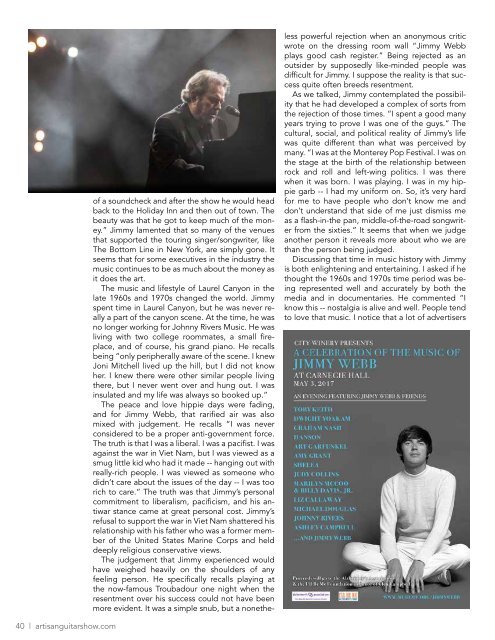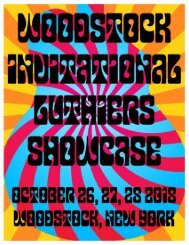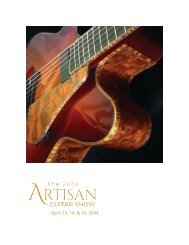2019 AGS Magazine_V5
Magazine for the 2019 Artisan Guitar Show
Magazine for the 2019 Artisan Guitar Show
You also want an ePaper? Increase the reach of your titles
YUMPU automatically turns print PDFs into web optimized ePapers that Google loves.
of a soundcheck and after the show he would head<br />
back to the Holiday Inn and then out of town. The<br />
beauty was that he got to keep much of the money.”<br />
Jimmy lamented that so many of the venues<br />
that supported the touring singer/songwriter, like<br />
The Bottom Line in New York, are simply gone. It<br />
seems that for some executives in the industry the<br />
music continues to be as much about the money as<br />
it does the art.<br />
The music and lifestyle of Laurel Canyon in the<br />
late 1960s and 1970s changed the world. Jimmy<br />
spent time in Laurel Canyon, but he was never really<br />
a part of the canyon scene. At the time, he was<br />
no longer working for Johnny Rivers Music. He was<br />
living with two college roommates, a small fireplace,<br />
and of course, his grand piano. He recalls<br />
being “only peripherally aware of the scene. I knew<br />
Joni Mitchell lived up the hill, but I did not know<br />
her. I knew there were other similar people living<br />
there, but I never went over and hung out. I was<br />
insulated and my life was always so booked up.”<br />
The peace and love hippie days were fading,<br />
and for Jimmy Webb, that rarified air was also<br />
mixed with judgement. He recalls “I was never<br />
considered to be a proper anti-government force.<br />
The truth is that I was a liberal. I was a pacifist. I was<br />
against the war in Viet Nam, but I was viewed as a<br />
smug little kid who had it made -- hanging out with<br />
really-rich people. I was viewed as someone who<br />
didn’t care about the issues of the day -- I was too<br />
rich to care.” The truth was that Jimmy’s personal<br />
commitment to liberalism, pacificism, and his antiwar<br />
stance came at great personal cost. Jimmy’s<br />
refusal to support the war in Viet Nam shattered his<br />
relationship with his father who was a former member<br />
of the United States Marine Corps and held<br />
deeply religious conservative views.<br />
The judgement that Jimmy experienced would<br />
have weighed heavily on the shoulders of any<br />
feeling person. He specifically recalls playing at<br />
the now-famous Troubadour one night when the<br />
resentment over his success could not have been<br />
more evident. It was a simple snub, but a nonetheless<br />
powerful rejection when an anonymous critic<br />
wrote on the dressing room wall “Jimmy Webb<br />
plays good cash register.” Being rejected as an<br />
outsider by supposedly like-minded people was<br />
difficult for Jimmy. I suppose the reality is that success<br />
quite often breeds resentment.<br />
As we talked, Jimmy contemplated the possibility<br />
that he had developed a complex of sorts from<br />
the rejection of those times. “I spent a good many<br />
years trying to prove I was one of the guys.” The<br />
cultural, social, and political reality of Jimmy’s life<br />
was quite different than what was perceived by<br />
many. “I was at the Monterey Pop Festival. I was on<br />
the stage at the birth of the relationship between<br />
rock and roll and left-wing politics. I was there<br />
when it was born. I was playing. I was in my hippie<br />
garb -- I had my uniform on. So, it’s very hard<br />
for me to have people who don’t know me and<br />
don’t understand that side of me just dismiss me<br />
as a flash-in-the pan, middle-of-the-road songwriter<br />
from the sixties.” It seems that when we judge<br />
another person it reveals more about who we are<br />
than the person being judged.<br />
Discussing that time in music history with Jimmy<br />
is both enlightening and entertaining. I asked if he<br />
thought the 1960s and 1970s time period was being<br />
represented well and accurately by both the<br />
media and in documentaries. He commented “I<br />
know this -- nostalgia is alive and well. People tend<br />
to love that music. I notice that a lot of advertisers<br />
are using that music -- The Beatles and The Rolling<br />
Stones – it would not surprise me to see Joe Cocker<br />
advertising socks.” The reflections and insights<br />
of Jimmy Webb on that time in American history<br />
come from someone who is eminently qualified to<br />
speak on the subject.<br />
It is easy to agree when Jimmy states “Nothing<br />
has come close to that time in music. I am going to<br />
make one of those statements that I am famous for<br />
-- I don’t think there is any music since the 1960s<br />
and 1970s that has been any better.” Jimmy is a<br />
master craftsman, so “melody, chord structure,<br />
construction, the architecture of the way these<br />
things were put together” are all very important to<br />
him. “To me, that all seemed to have peaked with<br />
The Beach Boys and Pet Sounds.” Respected record<br />
producer George Martin, who produced The<br />
Beatles, was like a second father to Jimmy. Martin’s<br />
view of the seminal work created by Brian Wilson in<br />
the Pet Sounds recording supports Jimmy Webb’s<br />
opinion. Jimmy quoted George Martin from a<br />
conversation they shared, “Sgt. Pepper’s Lonely<br />
Hearts Club Band was only an attempt to equal<br />
Pet Sounds.” The meaning of Martin’s comment<br />
was quite simply that The Beatles had created a<br />
masterpiece that was not the artistic equal to Pet<br />
Sounds. Jimmy believes that those two albums<br />
together “created one of the most fertile and experimental<br />
audio scenes” in history. For those of<br />
us who lived through those musical times, those<br />
moments can only be remembered as magical.<br />
As the years have unfolded, the impact of Jimmy’s<br />
own body of work on musicians has been profound.<br />
It is dangerous to begin listing those with<br />
whom he has worked because of the risk of missing<br />
someone significant. As examples of his collaborative<br />
efforts, his album releases Still Within the<br />
Sound of My Voice (2013) and Just Across the River<br />
(2010) show clearly the appreciation his work commands.<br />
These fine recordings include performance<br />
partnerships with Mark Knopfler, Jackson Browne,<br />
Linda Ronstadt, Keith Urban, David Crosby and<br />
Graham Nash, Brian Wilson, Vince Gill, Billy Joel,<br />
40 | artisanguitarshow.com<br />
artisanguitarshow.com | 41




